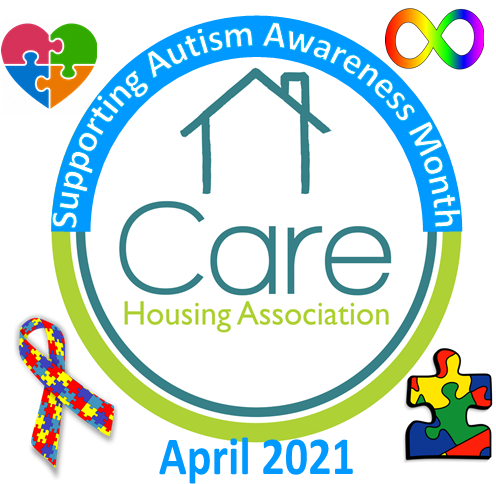In support of Autism Awareness Month – April 2021
As housing professionals we’re part of the support team for the tenants who live in our properties. We don’t need to be experts but we do need to have a working knowledge of their housing needs and means of communication. We have good relationships with our service providers and, in many cases, with the families of tenants and we turn to them for information on how best to communicate and relate with the person receiving support.
For effective person-centred communication, support and to build a trusting relationship with people who have autism, in particular, we need to take a number of things into account. Here are some examples:
- Giving the person time and space to tell you what they want to say. Not talking over them or hurrying them. There may be a delay in processing information for them.
- Having an awareness that the person may not gain or maintain eye contact and not trying to force this as it may even be physically painful for the person.
- Being aware of non-verbal communications. Trying to pick up on gestures, sounds etc., the person may be trying to communicate something really important to us. We know not being able to speak is not the same as not having something to say.
- Understanding that a person with autism may have trouble managing or even identifying their own emotions and that might result in behaviours we might not expect.
- Understanding that the person may well have thought processes that are different to ours, but are no less valid.
- Picking up on what’s important to the person either from the person themselves or their support team. What’s not important to us might be central to the person’s happiness or daily functioning.
- Being aware of sensory considerations e.g. not physically touching the person, it can be hugely physically painful or distressing for them; think about pitch and tone of your voice and even not wearing strong perfumes.
Above all else, remembering the person is an individual and all individuals, with or without autism, are not the same. There may be some common themes but not all of these are present in all people.
We’re aware of how important it is that our tenants have predictability and that things aren’t just sprung on them in surprise. An example of this is how we work alongside one service provider: our housing officer provided them with a pen-picture of herself so they could work with the tenant to prepare them for meeting her. For another tenant, the housing officer writes a couple of weeks in advance of her visits so the tenant can write the date and time down; he struggles to cope with short notice or ad-hoc arrangements. We also write to someone regularly to clarify tenancy ‘rules’ as they respond better to written rules and, as they see it, the ‘authority’ of a letter. We have this arrangement in conjunction with the support provider. It’s also often the case that someone gains security from having things written down rather than keeping things in their head which can cause unnecessary stress.
We’re currently working on extending our easy-read, or tenant-friendly, information. We’ve just finalised an easy-read tenancy agreement which can be adapted for each individual. Whilst we acknowledge that any format isn’t perfect for everyone, we are more than willing to work alongside support teams to tailor documents to any individual if it helps that person to understand it. Click here to see an example.
We’re always very keen to hear suggestions on how we can improve what we do or to find out about good practice examples we can follow – please tell us if you know of anything you feel might be useful.
Look out for one more article we’ll be sharing in support of Autism Awareness Month 2021

